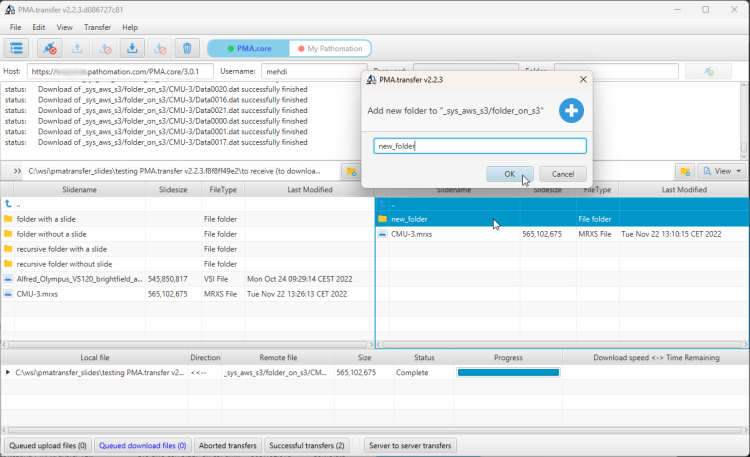Pathomation releases an updated version PMA.transfer to easily manipulate whole slide images in digital pathology and virtual microscopy
Just as important as having state-of-the-art digital pathology software, are the tools that are built and provided around such infrastructure. Today Pathomation releases PMA.transfer 2.2.3. PMA.transfer is an important component in the Pathomation software platform for digital pathology when scaling up and automating your slide manipulation capabilities.

Yves Sucaet, Pathomation’s CEO, explains the needs for such a tool: “Virtual slides are complex in build-up. Any type of data that is stored on a computer comes down to a physical file on a hard disk. Various software vendors have come up with different strategies to store virtual slides as such physical data. A single slide can be stored as a single file, but also as multiple files. This distinction is not always clear, and often leads to confusion when sharing slides with others”
PMA.transfer helps move around large amounts of virtual slides. The end-user only needs to tell the software to “transfer these slides from A to B”, PMA.transfer is smart enough to figure out what physical files go along with it. The specific nature of how slides are represented on storage media is hidden, and the complexities are handled behind the scenes. It doesn’t matter whether the final destination is a local on-premise RAID device, or (cloud-based) S3 storage.
Effort also went into introducing the necessary checks and balances before, during, and after a transfer operation.
Yves Sucaet continues: “PMA.transfer works in collaboration with PMA.start, a free local version of PMA.core, our CE-IVD certified tile server. PMA.start reads from and writes to the local hard disk. This allows for the software to perform a slide integrity check before the transfer begins; there’s nothing more frustrating than to wait for 2 Gigabytes of data to upload, only to realize afterwards that the initial slide was somehow corrupt from the beginning”.
Transfers that are interrupted during the upload (or download) process automatically resume once a connection is re-established. Upon completion, a secondary integrity check takes place, to confirm that a transferred slide’s fingerprint corresponds to the source slide.
“PMA.transfer will be particularly appreciated by My Pathomation users”, says Mehdi Sahri, software lead for the product. “My Pathomation is very user friendly to upload slides one by one, but not that well suited for larger batch-based transfers”.
Upon launching PMA.transfer, users choose to either connect to an on-premise PMA.core instance, or an institutional cloud-based My Pathomation account. For power-users, different connection profiles can be tracked simultaneously.
About Pathomation:
Pathomation was founded in Belgium in 2012. Its free software, PMA.start, has global adaptation and is used at 450+ sites each month. Its online My Pathomation cloud platform offers free 10 GB accounts. PMA.core is a clinical diagnostic use CE-IVD certified tile server targeted at any organization that interacts with digital pathology and virtual microscopy data. Pathomation software supports over 35 different proprietary file formats. Visit the website at https://www.pathomation.com/
